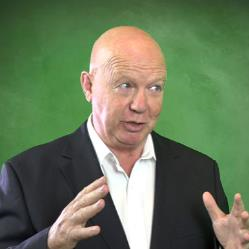 "Sales leaders need to be ahead of the game, proactively riding the change wave" - Interview by John Smibert
"Sales leaders need to be ahead of the game, proactively riding the change wave" - Interview by John Smibert
Everywhere we turn people are talking about how change is accelerating the world of B2B sales.
I wanted to get a feel about what this accelerating change means for our sales leaders. I wanted to know what their responsibility is in managing their organisation through that change.

So I asked Wayne Moloney what the sales manager's role was relative to change. Why Wayne? Because he had dedicated a chapter of his book "Your Roadmap to Sales Management Success" to the role of the sales leader in managing change.
In fact Wayne states that the sales managers responsibility is to drive change - to be the change agent.
Those sales managers who are having change thrust upon them, and reacting, are not providing an adaquate service to their organisation. They are not managing risk and opportunity
View or read the full discussion with Wayne below. This interview is likely to be of interest to the CEO, CSO, sales leaders and sales managers.
************
Wayne Moloney is a leading business strategist specialising in sales and business development. Wayne has a very specific specialisation in 'lean selling'.
See more of the 'TALKING SALES' video series here
Interview:
John: Hello, I'm here again with Wayne Moloney - welcome back, Wayne!
Wayne: Hi, John!
John: It's good to see you, and I'm really looking forward to this subject. This is chapter nine in your book, and you talk about a sales manager needs to be a great change agent.
Wayne: Yes. It's a topic that's close to your heart I know, John.
John: We're going to have a good discussion on this one!
Wayne: Yes.
John: So, what do you mean by he needs to be a good change agent?
Wayne: John, guys like you and I, that have been in sales as long as we have, we've seen a lot of change over the years, but I think you'd agree there's never been more change than what we've seen over the last decade, and probably the last couple of years in particular.
John: It's just accelerating, isn't it? Massive acceleration!
Wayne: Yes, absolutely. And people that don't accept that change... Remember, it was Charles Darwin... People say survival of the fittest. Well, Darwin didn't say that, he said it was the survival of those capable of change, as distinct from survival of the fittest, and it's very much the same in selling; as that environment changes, the market's changing. The way customers go through the old clichéd buyer's journey, the way they go through that now, regardless of what ~statue~ you believe, they're engaging much more offline or off the sales cycle that you're in than what they were previously.
 John: Yes. We often get a conflict between the sales process and the buying process now, because the buyers are so much better-informed. We're no longer there to provide content and information about our company and our products, they've got access to all of that, and that's driven massive change in thinking, hasn't it?
John: Yes. We often get a conflict between the sales process and the buying process now, because the buyers are so much better-informed. We're no longer there to provide content and information about our company and our products, they've got access to all of that, and that's driven massive change in thinking, hasn't it?
Wayne: Yes.
John: And then social media and... Sorry, I'm taking over here, but I'm excited about what we're talking about here!
Wayne: Yes, exactly - everything you're talking about is absolutely the case. The way people sell has to change to accommodate the way the market buys. You talk a lot about personal branding. It's about building a brand online which was never done before, or the way you network now has changed. It's not the case now of networking physically and getting to events and networking that way, although that's still got merit.
John: It's still very valid.
Wayne: It's now about how do you network online and how do you build that. And those organisations that don't support and encourage their staff to do that are going to fall by the wayside.
John: I'm a great proponent... I've had discussions with Tony Hughes and others about the fact that salespeople actually do some marketing these days, and what they do is they have to build their own profile and their personal brand, and that means communicating and sharing content and actually writing content. Salespeople may have to become writers; the leading ones are doing that right now.
Wayne: Yes. A term used a lot is thought leader. By definition, there can only be one thought leader, but you need to take a position where people would see you as understanding the market, understanding their industry, adding value to that. How do you do that? You do it by using social media to search for what's happening in people's industries. You do it by using social media to build your brand and communicate and provide content out.
John: But also, listening to your other customers about what they're achieving and the challenges they're facing and how they've addressed that, and bringing that insight to the table which can be leadership insight. And that can drive change in your new customers as well.
Wayne: Yes, that's right. We've sort of focused in a little bit on that social media side because it's just such a big part of selling these days. But if you think about that change agent, we're also talking about the way organisations report, and what we're talking about there is to get that change within an organisation, the change may not just be with the market or with the customer, the change may be internal, that you've got to start to get the organisation internally thinking differently to the way they demand reports.
 John: And perhaps being more collaborative in the way they operate and so on, which is what's happening. And, of course, your competitors are driving change as well so you need to be across that. So, I guess what you're saying is as a sales manager I have to be on the leading edge of that change and understanding what it means, and being an agent to drive that change and what it means inside our own organisation, particularly in our specific team.
John: And perhaps being more collaborative in the way they operate and so on, which is what's happening. And, of course, your competitors are driving change as well so you need to be across that. So, I guess what you're saying is as a sales manager I have to be on the leading edge of that change and understanding what it means, and being an agent to drive that change and what it means inside our own organisation, particularly in our specific team.
Wayne: Yes, and I guess there's two points there. One is, you don't need to understand the technology of it, you need to understand the application of it and what benefit it can deliver to your team. You also need to be able to help your team sift through so much information out there and so much technology, especially with apps these days that are being thrown at them, and get the stuff that's most useful for them, and then help make that change within the organisation.
John: Being a change agent is essentially knowing how to adapt to change, identifying the change and managing the way you adapt to that change to leverage the greatest productivity and be ahead of the game as much as possible, without hanging out there on a cliff.
Wayne: Yes, very much so, John.
John: Okay. So, that's essentially what the chapter is all about.
Wayne: Yes. As I say, it's about change; the world's changing, the sales environment is changing more rapidly than it's ever done in the past. We need to keep up with that. The sales manager doesn't need to understand all the technology but he needs to understand how to apply it.
John: So, as a sales manager you need to embrace change and be the agent that drives that change, particularly in your own team but in your own organisation.
Wayne: Well said!
John: Thanks, Wayne - look forward to the next time!
Wayne:
***************
More interviews with Wayne Moloney:
***************

Your Invitation: I invite you to join the Sales Leader Forum group on LinkedIn where you can experience informative discussions with your peers and sales thought leaders on subjects like the one we have discussed here. I also invite you to subscribe to the
- Sales Leader Resource Centre here
- Sales Leader YouTube channel here (300+ sales leadership videos)
Please Share: If you valued this article, please share via your Twitter, LinkedIn, Google+ and Facebook social media platforms. I encourage you to join the conversation or ask questions. So feel free to add a comment on this post - I promise to respond. If inclined please follow my LinkedIn post page here.
Want to touch base? If you have questions please feel free to contact me - email: john.smibert(at)salesleaderforums.com, Phone: +61 404857893 or Skype: john.smibert